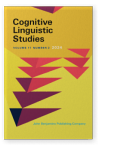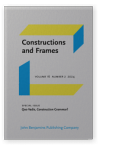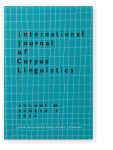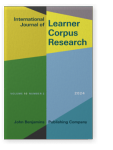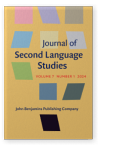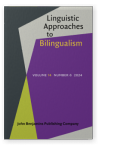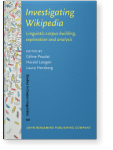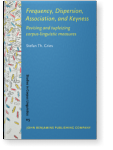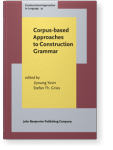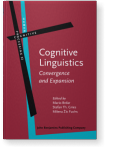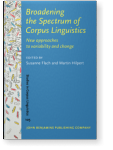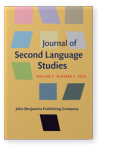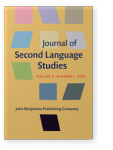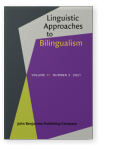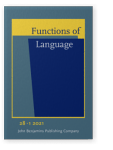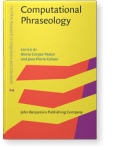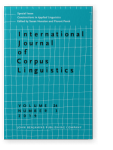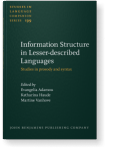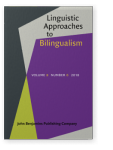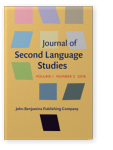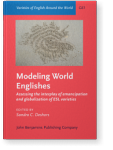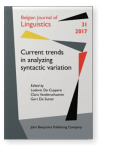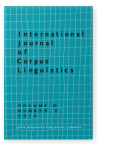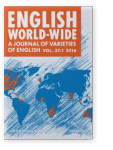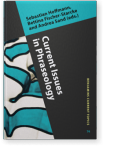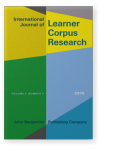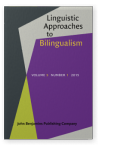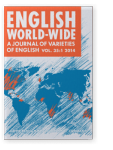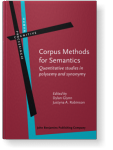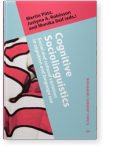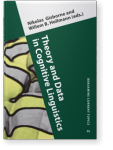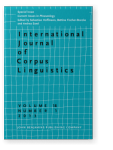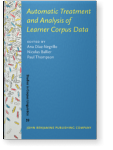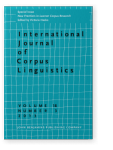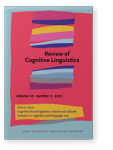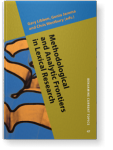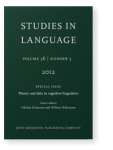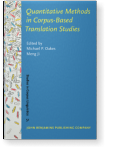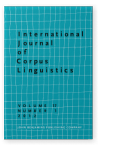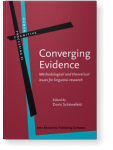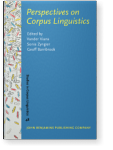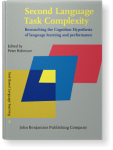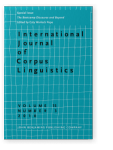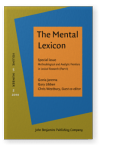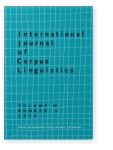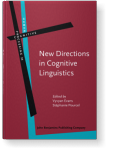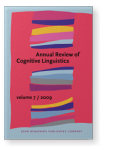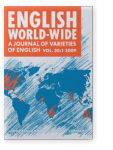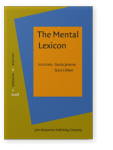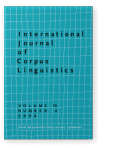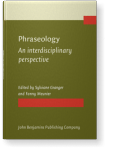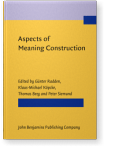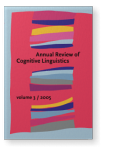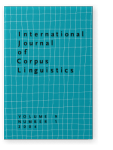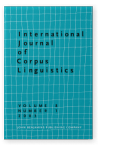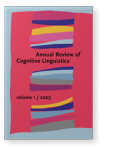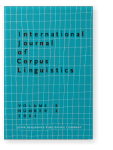Stefan Th. Gries
List of John Benjamins publications for which Stefan Th. Gries plays a role.
Journals
ISSN 1876-1933 | E-ISSN 1876-1941
ISSN 1384-6655 | E-ISSN 1569-9811
ISSN 2215-1478 | E-ISSN 2215-1486
ISSN 2542-3835 | E-ISSN 2542-3843
ISSN 1879-9264 | E-ISSN 1879-9272
Book series
Titles
Frequency, Dispersion, Association, and Keyness: Revising and tupleizing corpus-linguistic measures
Stefan Th. Gries
[Studies in Corpus Linguistics, 115] 2024. vii, 321 pp.
Subjects Computational & corpus linguistics | Corpus linguistics | Theoretical linguistics
Corpus-based Approaches to Construction Grammar
Edited by Jiyoung Yoon and Stefan Th. Gries
[Constructional Approaches to Language, 19] 2016. vi, 268 pp.
Subjects Corpus linguistics | Syntax | Theoretical linguistics
Cognitive Linguistics: Convergence and Expansion
Edited by Mario Brdar, Stefan Th. Gries and Milena Žic Fuchs
[Human Cognitive Processing, 32] 2011. vii, 362 pp.
Subjects Cognition and language | Cognitive linguistics | Theoretical linguistics
2022 MuPDAR for corpus-based learner and variety studies: Two (more) suggestions for improvement Broadening the Spectrum of Corpus Linguistics: New approaches to variability and change, Flach, Susanne and Martin Hilpert (eds.), pp. 257–283 | Chapter
Corpus-based studies of learner language and (especially) English varieties have become more quantitative in nature and increasingly use regression-based methods and classifiers such as classification trees, random forests, etc. One recent development that is becoming more widely used is the… read more
2022 What do (most of) our dispersion measures measure (most)? Dispersion? Journal of Second Language Studies 5:2, pp. 171–205 | Article
This paper discusses the degree to which most of the most widely-used measures of dispersion in corpus linguistics are not particularly valid in the sense of actually measuring dispersion rather than some amalgam of a lot of frequency and a little dispersion. The paper demonstrates these issues… read more
2022 What do (some of) our association measures measure (most)? Association? Journal of Second Language Studies 5:1, pp. 1–33 | Article
This paper discusses the degree to which some of the most widely-used measures of association in corpus linguistics are not particularly valid in the sense of actually measuring association rather than some amalgam of a lot of frequency and a little association. The paper demonstrates these… read more
2021 Cross-language effects of phonological and orthographic similarity in cognate word recognition: The role of language dominance Linguistic Approaches to Bilingualism 11:3, pp. 389–417 | Article
This study investigated the extent to which phonological and orthographic overlap between the two languages of bilinguals predicts word processing abilities in their dominant and non-dominant languages. Forty-four English-dominant L1 English-L2 Spanish speakers and Spanish-dominant Spanish… read more
2021 How do speakers and hearers disambiguate multi-functional words? The case of well Functions of Language 28:1, pp. 55–80 | Article
Well is an exemplary multi-functional word performing pragmatic and syntactic functions. That multi-functionality poses a potential problem: How do hearers in conversation determine which function is actualized and how do speakers project the function actualized? We address both questions… read more
2020 Computational extraction of formulaic sequences from corpora: Two case studies of a new extraction algorithm Computational Phraseology, Corpas Pastor, Gloria and Jean-Pierre Colson (eds.), pp. 83–110 | Chapter
We describe a new algorithm for the extraction of formulaic language from corpora. Entitled MERGE (Multi-word Expressions from the Recursive Grouping of Elements), it iteratively combines adjacent bigrams into progressively longer sequences based on lexical association strengths. We then provide… read more
2019 15 years of collostructions: Some long overdue additions/corrections (to/of actually all sorts of corpus-linguistics measures) Constructions in Applied Linguistics, Hunston, Susan and Florent Perek (eds.), pp. 385–412 | Article
This paper discusses a variety of potential shortcomings of most of the most widely-used association measures as used in collocation research and collostructional analyses. To address these shortcomings, I then discuss a research program called tupleization, an approach that does away with the… read more
2018 Chapter 3. Prosodic and morphological focus marking in Ixcatec (Otomanguean) Information Structure in Lesser-described Languages: Studies in prosody and syntax, Adamou, Evangelia, Katharina Haude and Martine Vanhove (eds.), pp. 51–84 | Chapter
This paper presents the first description of the expression of focus in Ixcatec, a nearly extinct language of Mexico. The study is based on experimental tasks carried out with the last three fluent speakers of Ixcatec. Prosodic analysis shows that in Ixcatec, a language with three lexical tones,… read more
2018 On over- and underuse in learner corpus research and multifactoriality in corpus linguistics more generally Journal of Second Language Studies 1:2, pp. 277–309 | Article
This paper critically discusses how corpus linguistics in general, but learner corpus research in particular, has been dealing with all sorts of frequency data in general, but over- and underuse frequencies in particular. I demonstrate on the basis of learner corpus data the pitfalls of using… read more
2018 A corpus-linguistic account of the history of the genitive alternation in Singapore English Modeling World Englishes: Assessing the interplay of emancipation and globalization of ESL varieties, Deshors, Sandra C. (ed.), pp. 245–280 | Chapter
In this paper, we are exploring the history of the genitive alternation (of- vs. s-genitive) in Singapore English based on corpus data covering both British English (as the historical input variety) and Singapore English (as the target variety whose diachronic development we are interested in).… read more
2017 Syntactic alternation research: Taking stock and some suggestions for the future Current trends in analyzing syntactic variation, De Cuypere, Ludovic, Clara Vanderschueren and Gert de Sutter (eds.), pp. 8–29 | Article
Over the last 20 or so years, research on syntactic alternations has made great strides in both theoretical and methodological ways. On the theoretical side, much of the research on syntactic alternations was restricted to generative linguistics debating how near synonymous constructions… read more
2016 Profiling verb complementation constructions across New Englishes: A two-step random forests analysis of ing vs. to complements International Journal of Corpus Linguistics 21:2, pp. 192–218 | Article
In this paper, we explore verb complementation patterns with to and ing in native English (British and American English) as compared to three Asian Englishes (Hong Kong, Indian, and Singaporean English). Based on data from the International Corpus of English annotated for variables describing the… read more
2016 Exploring epicentres empirically: Focus on South Asian Englishes English World-Wide 37:1, pp. 1–25 | Article
The present paper studies the dative alternation with GIVE, i.e. the alternation between the double-object construction (e.g. John gave Mary a book) and the prepositional dative (e.g. John gave a book to Mary), in relation to the norms underlying this constructional choice in six South Asian… read more
2016 Corpus-based approaches to Construction Grammar: Introduction Corpus-based Approaches to Construction Grammar, Yoon, Jiyoung and Stefan Th. Gries (eds.), pp. 1–8 | Article
2015 50-something years of work on collocations: What is or should be next … Current Issues in Phraseology, Hoffmann, Sebastian, Bettina Fischer-Starcke and Andrea Sand (eds.), pp. 135–164 | Article
This paper explores ways in which research into collocation should be improved. After a discussion of the parameters underlying the notion of collocation, the paper has three main parts. First, I argue that corpus linguistics would benefit from taking more seriously the understudied fact that… read more
2015 EFL and/vs. ESL? A multi-level regression modeling perspective on bridging the paradigm gap International Journal of Learner Corpus Research 1:1, pp. 130–159 | Article
The study of learner language and that of indigenized varieties are growing areas of English-language corpus-linguistic research, which are shaped by two current trends: First, the recognition that more rigorous methodological approaches are urgently needed (with few exceptions, existing work is… read more
2015
This study presents a contrastive analysis of 3624 instances of prenominal adjective order retrieved from the Chinese and German sections of the International Corpus of Learner English and the International Corpus of English. The data was annotated for nine determinants of adjective order,… read more
2014 The dative alternation in South Asian English(es): Modelling predictors and predicting prototypes English World-Wide 35:1, pp. 7–31 | Article
The present paper focuses on the modelling of cross-varietal differences and similarities in South Asian English(es) and British English at the level of verb complementation. Specifically, we analyse the dative alternation with GIVE, i.e. the alternation between the double-object construction (John… read more
2014 A case for the multifactorial assessment of learner language: The uses of may and can in French-English interlanguage Corpus Methods for Semantics: Quantitative studies in polysemy and synonymy, Glynn, Dylan and Justyna A. Robinson (eds.), pp. 179–204 | Article
In this study, we apply Gries and Divjak’s Behavioral Profile approach to compare
native English can and may, learner English can and may, and French pouvoir.
We annotated over 3,700 examples across three corpora according to more
than 20 morphosyntactic and semantic features and we analysed the… read more
2014 Spread of on-going changes in an immigrant language Cognitive Sociolinguistics: Social and cultural variation in cognition and language use, Pütz, Martin, Justyna A. Robinson and Monika Reif (eds.), pp. 161–186 | Article
Turkish spoken in the Netherlands (NL-Turkish) sounds different in comparison to Turkish spoken in Turkey (TR-Turkish). Analyses of an NL-Turkish spoken corpus reveal that NL-Turkish is changing through literally translated Dutch constructions. Combining the cognitive linguistics framework with… read more
2014 Frequencies, probabilities, and association measures in usage-/exemplar-based linguistics: Some necessary clarifications Theory and Data in Cognitive Linguistics, Gisborne, Nikolas and Willem B. Hollmann (eds.), pp. 15–48 | Article
In the last few years, a particular quantitative approach to the syntax-lexis interface has been developed: collostructional analysis (CA). This approach is an application of association measures to co-occurrence data from corpora, from a usage-based/cognitive-linguistic perspective. In spite of… read more
2014 Frequency tables: Tests, effect sizes, and explorations Corpus Methods for Semantics: Quantitative studies in polysemy and synonymy, Glynn, Dylan and Justyna A. Robinson (eds.), pp. 365–389 | Article
This chapter provides an overview of statistical tests to analyze frequency data. Specifically, it discusses the use, logic, and interpretation of chi-squared tests of two-dimensional frequency tables as well as the computation of effect sizes for such tables, followed by several extensions and… read more
2013 50-something years of work on collocations: What is or should be next … Current issues in phraseology, Hoffmann, Sebastian, Bettina Fischer-Starcke and Andrea Sand (eds.), pp. 137–166 | Article
This paper explores ways in which research into collocation should be improved. After a discussion of the parameters underlying the notion of collocation, the paper has three main parts. First, I argue that corpus linguistics would benefit from taking more seriously the understudied fact that… read more
2013 Statistical tests for the analysis of learner corpus data Automatic Treatment and Analysis of Learner Corpus Data, Díaz-Negrillo, Ana, Nicolas Ballier and Paul Thompson (eds.), pp. 287–310 | Article
This paper is an overview of several basic statistical tools in corpus-based SLA research. I first discuss a few issues relevant to the analysis of learner corpus data. Then, I illustrate a few widespread quantitative techniques and statistical visualizations and exemplify them on the basis of… read more
2013 The genitive alternation in Chinese and German ESL learners: Towards a multifactorial notion of context in learner corpus research New Frontiers in Learner Corpus Research, Hasko, Victoria (ed.), pp. 327–356 | Article
This paper exemplifies an approach to learner corpus data that adopts a multifactorial definition of ‘context’. We apply a logistic regression to 2,986 attestations of genitive alternation (the squirrel’s nest vs. the nest of the squirrel) from the Chinese and German sub-sections of the… read more
2012 Spread of on-going changes in an immigrant language Cognitive Sociolinguistics: Social and cultural variation in cognition and language use, Pütz, Martin, Justyna A. Robinson and Monika Reif (eds.), pp. 401–426 | Article
Turkish spoken in the Netherlands (NL-Turkish) sounds different in comparison to Turkish spoken in Turkey (TR-Turkish). Analyses of NL-Turkish spoken corpus reveal that NL-Turkish is changing through literally translated Dutch constructions. Combining the cognitive linguistics framework with… read more
2012 Behavioral profiles: A fine-grained and quantitative approach in corpus-based lexical semantics Methodological and Analytic Frontiers in Lexical Research, Libben, Gary, Gonia Jarema and Chris Westbury (eds.), pp. 57–80 | Article
This paper introduces a fairly recent corpus-based approach to lexical semantics, the Behavioral Profile (BP) approach. After a short review of traditional corpus-based work on lexical semantics and its shortcomings, I explain the logic and methodology of the BP approach and exemplify its… read more
2012 Frequencies, probabilities, and association measures in usage-/exemplar-based linguistics: Some necessary clarifications Theory and data in cognitive linguistics, Gisborne, Nikolas and Willem B. Hollmann (eds.), pp. 477–510 | Article
In the last few years, a particular quantitative approach to the syntax-lexis interface has been developed: collostructional analysis (CA). This approach is an application of association measures to co-occurrence data from corpora, from a usage-based/cognitive-linguistic perspective. In spite of… read more
2012 Regression analysis in translation studies Quantitative Methods in Corpus-Based Translation Studies: A practical guide to descriptive translation research, Oakes, Michael P. and Meng Ji (eds.), pp. 35–52 | Article
This paper provides an overview of how to compute simple binary logistic regressions and linear regressions with the open source programming language R on the basis of data from the INTERSECT corpus of English texts and their French and German translations. First, we show how one of the key… read more
2012 Review of ((2008)): International Journal of Corpus Linguistics International Journal of Corpus Linguistics 17:1, pp. 147–149 | Review
2011 Introduction: Convergence and expansion in cognitive linguistics Cognitive Linguistics: Convergence and Expansion, Brdar, Mario, Stefan Th. Gries and Milena Žic Fuchs (eds.), pp. 1–6 | Article
2011 Studying syntactic priming in corpora: Implications of different levels of granularity Converging Evidence: Methodological and theoretical issues for linguistic research, Schönefeld, Doris (ed.), pp. 143–164 | Article
This chapter addresses syntactic priming (of the dative alternation) using corpus data from the ICE-GB corpus. Nearly 3,000 consecutive prime-target pairs were coded for their constructional choices as well as several other variables. The data are then analyzed on different levels of granularity:… read more
2011 Methodological and interdisciplinary stance in Corpus Linguistics Perspectives on Corpus Linguistics, Viana, Vander, Sonia Zyngier and Geoff Barnbrook (eds.), pp. 81–98 | Article
Stefan Th. Gries, Professor of Linguistics at the University of California, Santa Barbara (United States), brings out a challenging notion of Corpus Linguistics. He proposes its understanding should be merged with psycholinguistic and cognitive concerns. Gries has no qualms in classifying Corpus… read more
2011 Corpus data in usage-based linguistics: What’s the right degree of granularity for the analysis of argument structure constructions? Cognitive Linguistics: Convergence and Expansion, Brdar, Mario, Stefan Th. Gries and Milena Žic Fuchs (eds.), pp. 237–256 | Article
The use of corpus data in cognitive linguistics brings with it a host of methodological problems. One concerns the degree of granularity that provides the most insightful results. The present study investigates two granularity issues – different inflectional forms and (register-)based corpus parts.… read more
2011 Chapter 3. Corpus-driven methods for assessing accuracy in learner production Second Language Task Complexity: Researching the Cognition Hypothesis of language learning and performance, Robinson, Peter (ed.), pp. 61–88 | Chapter
Adopting the perspective of Ellis’s (2007) Associative-Cognitive CREED, this chapter proposes a measure of accuracy in learner production that is based on conditional probabilities. More specifically, we develop a definition of accuracy that involves ‘the proficient selection of constructions in… read more
2010 Corpus linguistics and theoretical linguistics: A love–hate relationship? Not necessarily… The Bootcamp Discourse and Beyond, Worlock Pope, Caty (ed.), pp. 327–343 | Article
2010 Behavioral profiles: A fine-grained and quantitative approach in corpus-based lexical semantics Methodological and Analytic Frontiers in Lexical Research (Part I), Jarema, Gonia, Gary Libben and Chris Westbury (eds.), pp. 323–346 | Article
This paper introduces a fairly recent corpus-based approach to lexical semantics, the Behavioral Profile (BP) approach. After a short review of traditional corpus-based work on lexical semantics and its shortcomings, I explain the logic and methodology of the BP approach and exemplify its… read more
2010 Lexical gravity across varieties of English: An ICE-based study of n-grams in Asian Englishes International Journal of Corpus Linguistics 15:4, pp. 520–548 | Article
In our earlier work on three Asian Englishes and British English, we showed how lexico-syntactic co-occurrence preferences for three argument structure constructions revealed differences between varieties that correlated well with Schneider’s (2003, 2007) model of evolutionary stages. Here, we turn… read more
2009 Behavioral profiles: A corpus-based approach to cognitive semantic analysis New Directions in Cognitive Linguistics, Evans, Vyvyan and Stéphanie Pourcel (eds.), pp. 57–75 | Article
2009 Psycholinguistic and corpus-linguistic evidence for L2 constructions Annual Review of Cognitive Linguistics: Volume 7, Ruiz de Mendoza Ibáñez, Francisco José (ed.), pp. 163–186 | Article
In Construction Grammar, highly frequent syntactic configurations are assumed to be stored as symbolic units in the mental lexicon alongside words. Considering the example of gerund and infinitival complement constructions in English (She tried rocking the baby vs. She tried to rock the baby), this… read more
2009 Collostructional nativisation in New Englishes: Verb-construction associations in the International Corpus of English English World-Wide 30:1, pp. 27–51 | Article
The present paper investigates the strength of verb-construction associations across various New Englishes on the basis of comparable corpora. In contrast to previous studies into verb complementation in New Englishes, we start off from three basic constructions in English — the intransitive, the… read more
2008 Clusters in the mind? Converging evidence from near synonymy in Russian The Mental Lexicon 3:2, pp. 188–213 | Article
This paper provides experimental evidence to support the existence of mental correlates of lexical clusters. Data were collected by means of a sorting task and a gap filling task designed to study the cognitive reality of clusters of near synonyms as well as of the properties that have high… read more
2008 Dispersions and adjusted frequencies in corpora International Journal of Corpus Linguistics 13:4, pp. 403–437 | Article
The most frequent statistics in corpus linguistics are frequencies of occurrence and frequencies of co-occurrence of two or more linguistic variables. However, such frequencies in isolation may sometimes be misleading since they do not take into consideration the degree of dispersion of the… read more
2008 1. Phraseology and linguistic theory: A brief survey Phraseology: An interdisciplinary perspective, Granger, Sylviane and Fanny Meunier (eds.), pp. 3–25 | Article
This chapter has three objectives. First, it argues in favor of more rigorous definitions of the term ‘phraseologism’ on the basis of six dimensions and exemplifies these dimensions for several different kinds of phraseologism. Second, it reviews the ways in which phraseologisms as defined here… read more
2007 Brutal Brits and persuasive Americans: Variety-specifc meaning construction in the into-causative Aspects of Meaning Construction, Radden, Günter, Klaus-Michael Köpcke, Thomas Berg and Peter Siemund (eds.), pp. 265–281 | Article
“England and America are two nations divided by a common language.”(George Bernard Shaw)Adopting a construction-based view of language (Goldberg 1995), we demonstrate that it is possible to uncover differences between British and American English at the lexicosyntactic level, showing that the… read more
2005 Do foreign language learners also have constructions? Annual Review of Cognitive Linguistics: Volume 3, Ruiz de Mendoza Ibáñez, Francisco José (ed.), pp. 182–200 | Article
In Construction Grammar, the ultimate grammatical unit is the construction, a conventionalized form-meaning pairing. We present interrelated evidence from three different methods, all of which speak in favor of attributing an ontological status to constructions for non-native speakers of English.… read more
2004 Extending collostructional analysis: A corpus-based perspective on `alternations' International Journal of Corpus Linguistics 9:1, pp. 97–129 | Article
This paper introduces an extension of distinctive-collocate analysis that takes into account grammatical structure and is specifically geared to investigating pairs of semantically similar grammatical constructions and the lexemes that occur in them. The method, referred to as… read more
2003 Testing the sub-test: An analysis of English -ic and -ical adjectives International Journal of Corpus Linguistics 8:1, pp. 31–61 | Article
This paper pursues two objectives, one linguistic and one methodological in nature. First, it is concerned with a corpus-based analysis of the degree to which pairs of -ic/-ical adjectives (e.g. classic/classical) are synonymous. Second, it investigates whether Church et al.'s (1994) sub-test can… read more
2003 Towards a corpus-based identification of prototypical instances of constructions Annual Review of Cognitive Linguistics: Volume 1, Ruiz de Mendoza Ibáñez, Francisco José (ed.), pp. 1–27 | Article
2003 Collostructions: Investigating the interaction of words and constructions International Journal of Corpus Linguistics 8:2, pp. 209–243 | Article
This paper introduces an extension of collocational analysis that takes into account grammatical structure and is specifically geared to investigating the interaction of lexemes and the grammatical constructions associated with them. The method is framed in a construction-based approach to… read more
The similative-pretence alternating pair and filler-slot relations: A revised version of distinctive collexeme analysis Constructions and Frames: Online-First Articles | Article
The present paper investigates the similative-pretence alternating pair in Mexican Spanish (como/igual que and como si constructions) based on the analysis of 1362 instances from The Corpus del Español NOW (News on the Web) corpus. We apply a revised version of distinctive collexeme analysis to… read more
